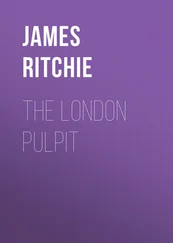James Ritchie - Here and There in London
Здесь есть возможность читать онлайн «James Ritchie - Here and There in London» — ознакомительный отрывок электронной книги совершенно бесплатно, а после прочтения отрывка купить полную версию. В некоторых случаях можно слушать аудио, скачать через торрент в формате fb2 и присутствует краткое содержание. Жанр: foreign_prose, Путешествия и география, на английском языке. Описание произведения, (предисловие) а так же отзывы посетителей доступны на портале библиотеки ЛибКат.
- Название:Here and There in London
- Автор:
- Жанр:
- Год:неизвестен
- ISBN:нет данных
- Рейтинг книги:4 / 5. Голосов: 1
-
Избранное:Добавить в избранное
- Отзывы:
-
Ваша оценка:
- 80
- 1
- 2
- 3
- 4
- 5
Here and There in London: краткое содержание, описание и аннотация
Предлагаем к чтению аннотацию, описание, краткое содержание или предисловие (зависит от того, что написал сам автор книги «Here and There in London»). Если вы не нашли необходимую информацию о книге — напишите в комментариях, мы постараемся отыскать её.
Here and There in London — читать онлайн ознакомительный отрывок
Ниже представлен текст книги, разбитый по страницам. Система сохранения места последней прочитанной страницы, позволяет с удобством читать онлайн бесплатно книгу «Here and There in London», без необходимости каждый раз заново искать на чём Вы остановились. Поставьте закладку, и сможете в любой момент перейти на страницу, на которой закончили чтение.
Интервал:
Закладка:
“The travelled thane, Athenian Aberdeen,”
the best-abused man, at one time, in her gracious Majesty’s dominions, but without whom, nevertheless, it is questionable whether the Queen’s Government could be carried on. Unfortunately, Lord Aberdeen is not the man for the public. The public likes to be gammoned, and his lordship cannot gammon. He is spare in words, cold and unimpassioned in delivery, and somewhat too indifferent to party attacks. On neighbouring benches are seated discontented Whigs, overlooked in the scramble for place, and who therefore view the proceedings of all governments with an impartial, but yet a jealous eye. Prominent amongst such is the sandy-looking unamiable Earl Grey, who seems angry with himself and all the world, because he is lame, and has not the command of the colonies. Below the table are half-a-dozen benches, on which congregate a few peers till dinner time. Here sits Earl Fitzwilliam – here also sits one of the most frightful bores in the House, Lord Monteagle, who always speaks, and, for a lord, cruelly long. That is the consequence of his having been in the Lower House. Never stop to hear him. As soon as you see his bald head, be off. The Dukes sit here. On the front bench on your right is the Duke of Cambridge. On his left is seated the Duke of Newcastle, a promising orator when a member of the Lower House, and a follower of Sir Robert Peel. Crossing to the government benches, the Earl of Derby fills the first place. We need not paint his portrait; the sharp aristocratic face – but feebly reflected in that promising young man, but unfortunate speaker, his son – is familiar to us all; there he is out of place. He has no fitting opponents. It was among the Commons that he won his laurels. Yet, at times, the old afflatus fills him, and his clear voice and fluent declamation are as bitter and terrible as when night after night he wrestled, as if for very life, with the brawny champion of Catholic Emancipation, and the somewhat too selfish, unscrupulous exponent of Irish wrongs. By his side is his trusty page, the inelegant and insipid Malmesbury, of whom, in a passing freak, the author of “Vivian Grey” not merely made a statesman, but actually Minister for Foreign Affairs. On the bench behind the Premier sits that wonderful old man eloquent, whose shrill tones may occasionally be heard, and whose intellect seems as great and grand as when he was Sir John Copley – Attorney-General before the Reform Bill was carried, and England, according to Croker, for ever undone. Near him sits a tall, thin gentleman, with a copious head of hair, and a force of gesticulation hardly English: that is the Earl of Ellenborough, in his own opinion hero, statesman, lawyer, “all things by turns, and nothing long;” in this respect second only to Lord Brougham, who sits everywhere, speaks wherever he can, and whose Ciceronian eloquence, aided by a delivery more expressive than dignified, by gestures and tones at any rate vivacious, astonish the weak nerves of the spectators, and oft-times puzzles the parliamentary reporters themselves. Few other notabilities do we see. Perhaps we may note on the opposition benches the pale aristocratic form of that popular nobleman, the Earl of Shaftesbury. Disraeli makes one of his peers say, the House of Lords looks like a house of butlers. We think the satirist is unjust. At any rate, the peers are well dressed. Hats, gloves, boots, and frock-coats are all unexceptionable. We need not say, in this respect, the House of Lords presents a very different appearance to the House of Commons. Yet the Lords need not be so particular about their “gorgeous array;” there are seldom more than half-a-dozen ladies present to admire and reward their display. The Lords are more polite than the Commons. Such ladies as are present take their seats in the gallery, where they can see and be seen; in the other house, as our readers know, the case is different. But even the ladies, we dare say, would not mind being treated as the Commons treat them, if the debates in the Lords were as good as in the Commons. If the peers did not dress so well, and were not so excessively polite, but spoke better, no great harm would be done; but there’s the difficulty. It is difficult for a polite man to be ill-bred, and to lose his temper, and say sharp things. In the House of Commons nothing is easier. Say something bitter, and you will have a murmur of applause – be savage, and at any rate your own party will cheer; but in the Lords you can’t get up the semblance of earnestness. The whole thing seems too much like play – an apology for business, and that is all. No man can speak to twenty sleepy peers as he could to four or five hundred eager partisans. No man can be impressive in the bosom of his family – and the Lords are a family party, all connected, or nearly so; and if a stranger comes in, he soon apes the fashionable tone, and becomes as dull and apathetic as the rest. And why should a lord be otherwise? A lord is not more a lord for having brains – nor the less a lord for being without. Intellect, skill, oratory, are no helps – are unnecessary in an hereditary institution. Sir Robert Peel knew this, and lived and died a commoner. Chatham became comparatively a small man when he took a pension and a peerage. So was it with Walpole, when meeting his old rival Pulteney, after they had both been raised to the peerage, he exclaimed, “Here we are, my lord, the two most insignificant personages in Europe.” The Upper House but registers the decisions of the Lower – the business of the country is carried on elsewhere.
But while we have been looking at the House, the debate has closed. Lord Granville has asked a question and made an attack. Lord Derby has uttered a few petulant remarks, to which Lord Aberdeen has made a cold and formal reply, to which some peers, disappointed of place, have added a little independent criticism on their own account. Two or three exquisites have been discussing little matters of their own, till they find that if they stop much longer they will be too late for Rotten Row, and the House merely waits for Lord Monteagle to sit down and go home. Happily his lordship is briefer than his wont, and the Lord High Chancellor declares the House adjourned. Rushing outside, we catch hasty glimpses of our hereditary legislators as they, in fashionable brougham or on splendid blood, start for their parks or respective Belgravian homes. We also, in more plebeian manner, do the same. We are sure the reader will have had enough of the Lords for one night. He will have found out that they are not much better orators or speakers than other men – that even lords stammer, utter incoherent remarks, display poverty of ideas. Let us add, in conclusion, the great merit of a night in the Lords is, that it is soon over. If the Lords be dull, at any rate they are short. To be dull and long-winded is an offence against good breeding of which few peers are guilty.
THE REPORTERS’ GALLERY
If it has ever been your lot, most magnanimous sir, to be in the neighbourhood of Westminster Hall about four any afternoon while Parliament is sitting, you must have observed more than one individual, with cheeks evidently “sicklied o’er with the pale cast of thought,” rushing into the door which leads to the Strangers’ Gallery in the House of Commons. If, however, you look well, you will see that the parties referred to, instead of going the whole length of the passage, as you are compelled to do when occasionally you get an order, turn sharply to the left and climb a flight of narrow stairs. If you manage to follow them, you will find at the top of the stairs a small lobby, where three or four boys, in the livery of the Electric Telegraph Company, are waiting to receive the parliamentary report, which almost immediately after is flashing along the wires to our great hives of industry, of intelligence, and life, or to the capitals of other lands – to Paris – to Vienna – to Berlin. You turn to the left and enter a small room set apart for refreshments – three or four individuals are seated at table, one drinking Bass’s far-famed ale, another feasting on juicy beef, another regaling himself with brandy-and-water, and another sipping the less stimulating and equally agreeable produce of the coffee plant. The happy fellows are poking their fun at each other in a mild and pleasant way, or possibly discussing the usual political topics of the day; others flit through the room with a celerity, as Mr. Squeers said of nature, easier imagined than described. Were they followed by gentlemen of Hebrew extraction, with those mysterious little slips of paper which contain letters of such magic power, they could not walk faster. As you listen, utterances of doubtful and dire import fall from their lips. “Palmerston is up,” says one. You are alarmed; you think the bottle-holder is in a rage, and you tremble for the consequences. Again you hear, “Lord John is down;” you are distressed at the intelligence, the old champion of civil and religious liberty you hoped would long have been preserved from such a catastrophe. The gentlemen around you, however, listen to such statements with the coolness of stoics, paying little or no regard to such announcements. One says to another, “When are you on?” another demands of his friend, whether he is off; another says he comes on at nine. You are puzzled to know what manner of men you are amongst. They are not strangers fresh from the country – they have too pale and town-like a look for that; they are not members – because members feast in another part of the house. You will soon see what they are! you leave that room and enter another, in which are a few well-dressed personages transcribing hurriedly, as if for life. The truth flashes upon you. “These men are the reporters,” you exclaim. For once, my good sir, you are right; and if you go through that glass-door you will find yourself in the Reporters’ Gallery.
Читать дальшеИнтервал:
Закладка:
Похожие книги на «Here and There in London»
Представляем Вашему вниманию похожие книги на «Here and There in London» списком для выбора. Мы отобрали схожую по названию и смыслу литературу в надежде предоставить читателям больше вариантов отыскать новые, интересные, ещё непрочитанные произведения.
Обсуждение, отзывы о книге «Here and There in London» и просто собственные мнения читателей. Оставьте ваши комментарии, напишите, что Вы думаете о произведении, его смысле или главных героях. Укажите что конкретно понравилось, а что нет, и почему Вы так считаете.












